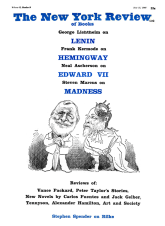For this new volume on the general theme of the changing Soviet system Professor Tucker has collected ten stimulating essays. Two of them, including one of the most thoughtful, “The Dialectics of Co-existence,” appear for the first time. Although the author claims no more than a “common purpose” for these essays, they do in fact collectively offer the reflections of one of the most mature and balanced scholars working in the Soviet field, on the general pattern of evolution of Soviet policy and society in the past decade, both in their internal and external aspects.
Professor Tucker does well to remind us in his first essay that the Soviet regime is neither unique nor absolved from the operation of the general principles of political science. It is in fact an example of what he calls a “revolutionary mass-movement regime,” and therefore follows a pattern for which in certain respects other similar mass movements offer valuable comparative insights. Using this form of analysis, Professor Tucker argues that Stalin in fact transformed the original “Bolshevik movement regime” into a new type of “fuchrcrist” movement-regime. His death accordingly meant much more than a change of autocrat, and raises the question whether the original movement pattern will be, or has been, revived. It is of course true that Stalin stifled party rule and replaced it by a more personal form of despotism in which the party became merely one of the several instruments of that despotism. But it also seems to me to be true that both Lenin and Khrushchev belong to the category of autocrats, even if Lenin used persuasion, manipulation, and political sleight-of-hand more than brute force to achieve his objects, and Khrushchev has evolved his own pattern of peasant cunning for achieving the same kind of result. This, it could be argued, makes the basic similarity and continuity of the variations of the Soviet regime since 1917 more significant than the differences observable in the several periods.
The question is of much more than theoretical importance since upon it may turn the further question of the future course of relations between the Soviet Union and the West, to which several of these essays are devoted. For there is a certain logic in the whole pattern of “de-Stalinization” at home and “détente” abroad which might seem to suggest that Khrushchev is much less in command of the system which he has inherited than Stalin was, and much more under pressure of circumstances which he cannot control. At home he seems to have been driven by pressures to break with the past which he could not or did not wish to resist. By his break with the past he has undermined the whole legitimacy of the Communist party’s claim to monopoly of power in a way of which the full consequences cannot be foreseen. Abroad, the “logic” of nuclear weapons has driven him to a break with China (for there is little doubt now that this is where the kernel of the dispute is to be sought) and in the process to imperil the whole world Communist movement. And here I tend to disagree with Professor Tucker, who seems to view the Khrushchev version of co-existence, with its excellent potentialities for political warfare so far as the Soviet Union is concerned, as derived from an ideological assessment of the situation. It seems to me to be based very squarely on bombs—if subversion or brinkmanship has become too dangerous, one must try something else. And then of course theory has to keep up with the realities, as usual.
Be that as it may, to return to the original question: is Khrushchev driven by circumstances which are outside his control? Or is he in fact the master of a new “dialectic of co-existence” from which he hopes to wring greater conquests for communism than were ever won by revolution or subversion? Professor Tucker provides no definite answer to this questioin, and indeed no answer may yet be possible. My own suspicion, somewhat in disagreement with what seems to be Professor Tucker’s general view of the evolution of the Soviet regime, is that Stalinism was the logical consequence of Leninism, if the system of one party rule was to survive at all; and that when once the attempt was made to “improve” Stalinism after Stalin’s death, the first steps were ultimate disintegration. No doubt Mao would readily endorse this view. But then, unlike Khrushchev, he has not been faced with the inconvenient problem of succession to a tyrant even more ruthless than himself. Besides, the prospects of nuclear war look very different in Peking from what they seem in Moscow, and this appears to have had a generally inhibiting effect on his former Soviet ally.
This Issue
June 11, 1964



